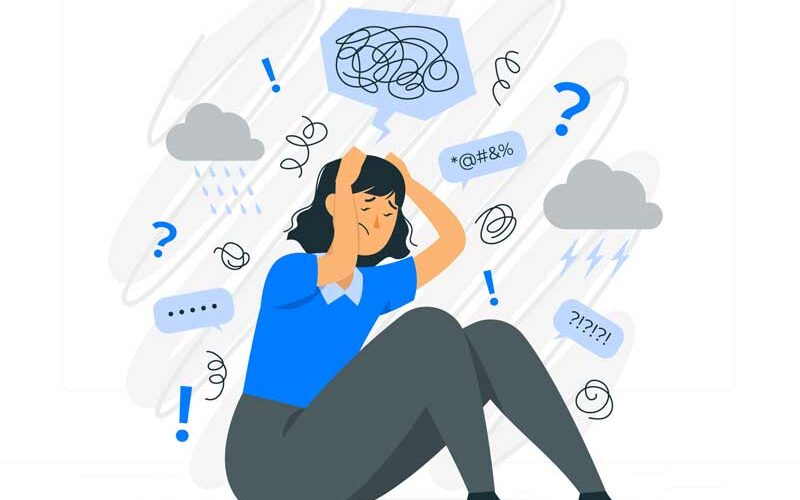Signs of anxiety
Anxiety disorder, commonly known as just anxiety, is the most common type of mental disorder. But as common as it is, less than half of the people who have anxiety get proper treatment. It is characterized as a feeling that combines tension, anxious thoughts, panic, and dread. Anxious people frequently experience pressure and unease, particularly in social situations and when they are alone. The severity varies widely, with some of the more severe instances posing serious challenges to day-to-day living (Felman, 2023). Some of the symptoms that anxiety might produce are listed below.
- Constantly feeling agitated and irritated is a common behavior for those with anxiety, since distress can lead to anger. In addition to this, they might get a racing pulse, sweaty palms, body shaking, and a dry mouth.
- Becoming restless or tired before and after, or even most of the time, is easy. However, just because someone is experiencing these two symptoms does not necessarily mean they have anxiety. Restlessness can be caused by simple stress, and fatigue occurs in other mental conditions such as depression.
- Ninety percent of people with general anxiety disorder have been found to have difficulties concentrating, and the worse the anxiety is, the harder it becomes to concentrate.
- Having trouble falling or staying asleep is a symptom that is closely linked with insomnia, since people with insomnia are anywhere from ten to seventeen times more likely to develop anxiety. However, it is currently unknown whether anxiety leads to insomnia or the other way around.
- Panic disorders are a type of anxiety where people experience frequent panic attacks. And while most people will say that panic attacks are not dangerous since they do not cause any physical damage, recurring panic attacks could accumulate a large amount of stress, which is bad for both general health and worsening anxiety.
- While being afraid of social situations is extremely common, especially with strangers or in front of a crowd, social anxiety disorder is more serious than simple fear. People with this specific type of anxiety are very likely to avoid social events as much as possible and always expect others to think negatively of them (Julson, 2023).
What causes anxiety, and how do you treat it?
The vagus nervous system runs from the brain all the way down to the abdomen. Along with carrying messages between the brain, digestive system, and organs, it is also one of the main parts of the parasympathetic system, which takes care of mood regulation, digestion, heart rate, and immune response. It is the root cause of the uncomfortable feeling in the stomach that follows a tense situation. Stress may easily cause damage to the vagus nerve system, which can result in anxiety, sadness, and other mental or even physical issues. Regular stimulation of the vagus nerve can improve its function and significantly reduce anxiety. It has been demonstrated that regular exercise, yoga, being in the cold, and exercise are all beneficial. Of course, the greatest outcomes are always obtained by abstaining from alcohol, tobacco, and stress. But even though this approach has proven to be rather successful, it is not a foolproof one (Styx, 2022).
Risks of anxiety
Some effects of anxiety are not physical, while others are more complicated. Some just make anxiety worse. Depression is a typical side effect of anxiety and is notorious for significantly raising the risk of suicide. In addition to being detrimental to one’s general physical and mental well-being, insomnia can cause headaches. Some careers require teamwork; therefore, it may be tough to perform well if you avoid social situations or have trouble focusing. Anxiety-related stomach discomfort can result in nausea and diarrhea. Ultimately, elevated blood pressure during episodes of worry creates space for risk (Cherney, 2023).
Cherney, K.,2023. Effects of Anxiety on the Body. [online] Healthline. Available at: https://www.healthline.com/health/anxiety/effects-on-body [Accessed 26 January 2024].
Felman, A.,2023. Anxiety: Overview, symptoms, causes, and treatments. [online] www.medicalnewstoday.com. Available at: https://www.medicalnewstoday.com/articles/323454#types [Accessed 26 January 2024].
Julson, E.,2023. Signs and Symptoms of Anxiety Disorders. [online] Healthline. Available at: https://www.healthline.com/health/anxiety-disorder-symptoms#difficulty-concentrating [Accessed 26 January 2024].
Styx, L.,2022. Can Vagus Nerve Therapy Regulate Mood and Anxiety? [online] Verywell Mind. Available at: https://www.verywellmind.com/can-vagus-nerve-therapy-regulate-mood-and-anxiety-6744380 [Accessed 26 January 2024].
